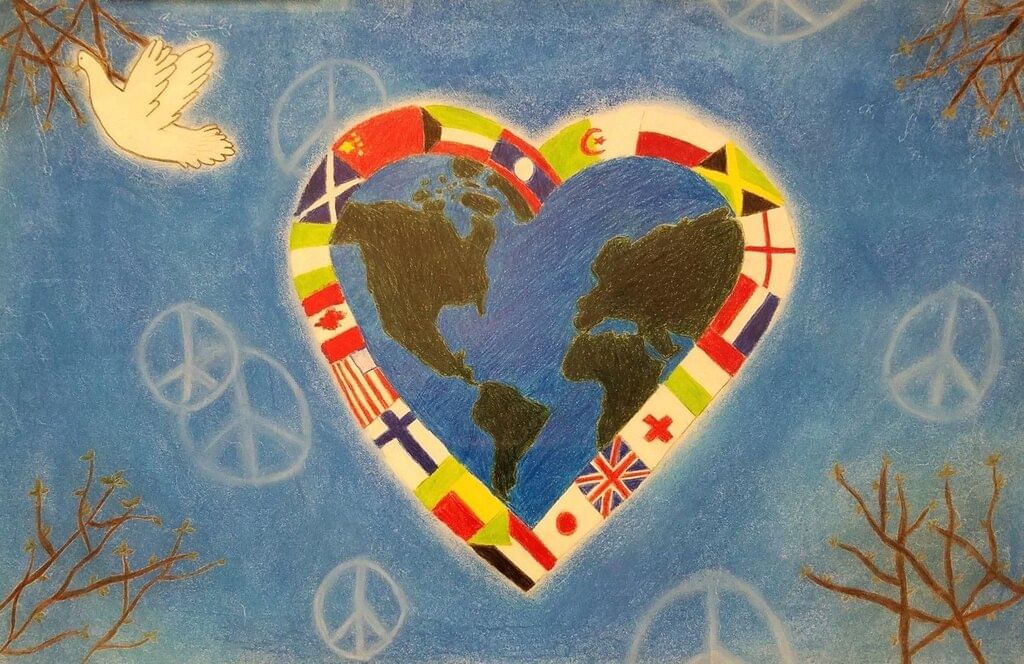Ethics: Aspects of Peace | Current Affairs & Hindu Analysis: Daily, Weekly & Monthly - UPSC PDF Download
| Table of contents |

|
| Introduction |

|
| Five Aspects of Peace |

|
| Key Stakeholders in Promoting Peace |

|
| Initiatives Undertaken to Restore and Promote Peace |

|
Introduction
Recently, world leaders at the 10th Global Forum of the UN Alliance for Civilizations adopted the Cascais Declaration, pledging to promote peace amid today's turbulent times. The declaration highlighted the importance of intergenerational dialogue for achieving peace, sustainable development, and human rights. Prior to this, the UNESCO HK Association's 2012 Peace Project introduced the Aspects of Peace—defining peace as harmony within individuals and across all aspects of life.

Five Aspects of Peace
| Aspect | Concept | Challenges |
|---|---|---|
| Individual/ Inner Peace | Enables individuals to handle life's challenges, reduce stress, and contribute positively to society. | Mental Health Issues (anxiety, depression) due to work-life imbalance, economic instability etc. Consumerism and Materialism. |
| Social Peace | Focuses on creating peaceful & harmonious relationships within communities, through collaboration, conflict resolution, equality, & justice. | Discrimination & Exclusion causes resentment and violence. Misinformation, hate speech and prejudices based on gender, race etc. |
| Ecological Peace | Emphasizes importance of sustainable development and a balanced relationship with the environment. | Climate change, extreme weather etc. contribute to resource conflicts and displacements. Insufficient cooperation on environmental issues. |
| Cultural Peace | Encourages understanding, respect, and appreciation for cultural diversity & cultural exchanges. | Ethnocentrism (Viewing one's own culture as superior), Cultural Intolerance, hate speech etc. |
| Political Peace | Fosters just, non-violent relationships within groups, organizations, and communities across government, business, and society. | Global: Territorial disputes, and rivalries, Weak International Governance, Proliferation of nuclear weapons etc. National: Lack of rule of law, nepotism, corruption. |
Some Philosophical Aspects of Peace
- Gandhian Conception of Peace: Gandhi's core idea of peace was rooted in Ahimsa (nonviolence) and Satya (truth). He also emphasized self-purification, simplicity, and compassion as prerequisites for societal peace.
- Utilitarian Concept of Peace:. peaceful society is one that enhances collective well-being, and peace is achieved when actions maximize overall happiness and minimize suffering.
- Kantian Notion of Peace: Peace is not a passive state but an active moral obligation of individuals and nations. Immanuel Kant believed in perpetual peace through rationality, universal morality, and international cooperation.
Key Stakeholders in Promoting Peace
Global/Political Peace
- Governments: Set policies, enact laws, and enforce regulations that promote peace, human rights, and justice within their countries and globally.
- International Organizations: Mediate conflicts, promote diplomacy, and coordinate efforts for global peace and sustainable development.
- Civil Society Organizations: Advocate for peace, human rights, and social change at local, national, and global levels.
Social and Cultural Peace
- Community Leaders: Resolve conflicts, advocate for justice, and foster social cohesion in their communities.
- Religious and Spiritual Leaders: Promote peace by advocating for love, compassion, forgiveness, and religious tolerance across cultural and religious divides.
- Mainstream Media and Social Media: Ensure peace by promoting truthful information and countering misinformation and hate speech.
Individual/Inner Peace
- Individuals: Practice tolerance, understanding, and empathy in daily life, creating peaceful environments within families and communities.
- Families: Instill values of non-violence, respect, and conflict resolution in children.
- Educational Institutions: Teach peaceful values, critical thinking, social justice, environmental sustainability, and conflict resolution.
Initiatives Undertaken to Restore and Promote Peace
- Global Peace: Global institutions like the World Bank and the UN foster dialogue, cooperation, and multipolarity to ensure global stability and peace.
- Political Peace: Institutions like the International Court of Justice (ICJ) and various peace negotiations and treaties ensure peaceful dispute settlements.
- Ecological Peace: Initiatives like the Paris Agreement address environmental degradation to prevent resource-based conflicts. Programs like the WWF's Earth Hour raise awareness about ecological sustainability.
- Inner Peace: Global events such as International Yoga Day and World Meditation Day foster mental well-being.
- Cultural Peace: UNESCO's World Culture Forums promote understanding between diverse cultural groups. UNESCO's cultural heritage programs work to preserve cultural landmarks and prevent their destruction during conflicts, symbolizing unity and peace.
Conclusion
Peace is a holistic concept that goes beyond the mere absence of conflict. It encompasses the active presence of harmony, justice, equality, and understanding both within individuals and between nations. By fostering peace from the inside out, we encourage sustainable solutions to global challenges such as human rights, environmental protection, and economic equity.
|
52 videos|5374 docs|1136 tests
|
FAQs on Ethics: Aspects of Peace - Current Affairs & Hindu Analysis: Daily, Weekly & Monthly - UPSC
| 1. What are the five aspects of peace? |  |
| 2. Who are the key stakeholders in promoting peace? |  |
| 3. What initiatives have been undertaken to restore and promote peace globally? |  |
| 4. How do ethics play a role in aspects of peace? |  |
| 5. Why is it important to promote peace in today's world? |  |














